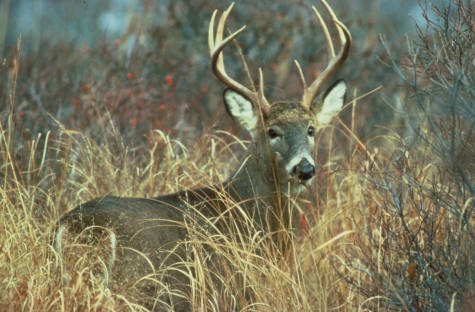Early Muzzleloader Deer Hunting Season Opens
Hunters Reminded to Practice Tree Stand Safety
 The first segment of Maryland’s Muzzleloader Deer Season opens statewide Oct. 20. It is one of several deer hunting opportunities offered in the state and typically occurs during some of the finest fall weather.
The first segment of Maryland’s Muzzleloader Deer Season opens statewide Oct. 20. It is one of several deer hunting opportunities offered in the state and typically occurs during some of the finest fall weather.
The early muzzleloader season runs from Oct. 20-22 in Deer Management Regions A and B. Region A consists of Garrett, Allegany and western Washington counties (private land codes 250 and 251), and Region B is the rest of the state. Hunters in Region B can also use muzzleloaders from Oct. 24-29 for antlerless deer only.
“Regulated deer hunting remains our most effective tools for managing the species in the state,” said Wildlife and Heritage Service Director Paul Peditto. “Hunting helps keep deer numbers in check while affording hunters the opportunity to enjoy the resulting venison or donate it to a very good cause.”
 As a reminder, the statewide bag limit for antlered white-tailed deer (bucks) is one per weapon season (i.e., archery, muzzleloader and firearm). Region B hunters can take one additional bonus buck after purchasing a Bonus Antlered Deer Stamp and taking two antlerless deer. Antlerless deer bag limits differ between the regions.
As a reminder, the statewide bag limit for antlered white-tailed deer (bucks) is one per weapon season (i.e., archery, muzzleloader and firearm). Region B hunters can take one additional bonus buck after purchasing a Bonus Antlered Deer Stamp and taking two antlerless deer. Antlerless deer bag limits differ between the regions.
The antler point restriction remains in effect for the coming hunting season. Deer hunters may harvest up to two antlered white-tailed deer within the yearly bag limit that do not meet the requirement of having at least three points on one antler. Any additional antlered deer taken within the established bag limit must meet the minimum point restriction. Licensed junior hunters are exempt from this restriction.
The early muzzleloader season is open statewide for sika deer of either sex, Oct. 20-22, and then for antlerless-only sika deer from Oct. 24-29. The Sika Deer Muzzleloader Season bag limit is three deer with no more than one being antlered. An antlered sika is defined as a deer with at least one antler visible above the hairline.
Season dates, bag limits, hunting regulations and registration procedures are located in the 2016-2017 Maryland Guide to Hunting & Trapping.
Hunters should carefully inspect all tree stands, and should always wear full-body safety harnesses when climbing in or out of stands as well as while in stands. The Maryland Department of Natural Resources strongly recommends that all hunters practice tree stand safety. That includes using a sliding knot, commonly known as a prussic knot, attached to a line that is secured above the stand that allows the hunter to be safely tethered to the tree as soon as they leave the ground.
The department also encourages hunters to donate any extra deer they may harvest to Farmers and Hunters Feeding the Hungry. Last year more than 600,000 venison meals were provided to food banks.
